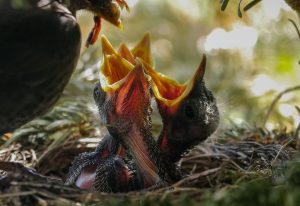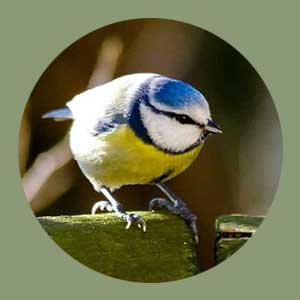You might be interested to know when birds fledge the nest if you have urgent hedge and tree pruning to undertake.
Before attempting any such jobs, it is wise to check that all the occupants have left the nest, as it is an offence to remove or damage them.
Fledging is the act of caring for and feeding nestlings (baby birds) until they can fly and care for themselves.
Different bird species take varying lengths of time, but most songbirds are ready to fledge the nest between 2 and 3 weeks old.
Table of Contents
How birds know the right time to fledge
Think of nestlings as teenagers; quite happy to let someone else cook and clean for them until they are given a gentle nudge into finding their own place.
Young birds will stay in the nest for as long as possible as with each passing day their wings develop more; they become strong.
Parent birds on the other hand do everything in their power to encourage the chicks to leave as quickly as possible.
Predation pressure
Adult birds know only too well the dangers of predators. If larger birds, cats, or rodents happen upon a nest filled with babies, they swipe them in one go.
As many as 70% of chicks succumb to this fate in UK gardens.
Parents need their young to be self-sufficient and aware of the danger as quickly as possible. It is their best chance of survival.

Fledglings need to get the timing right.
Birds need to assess the situation before leaving the nest for the final time; their lives depend on it.
If they attempt to leave too soon, their wings aren’t fully-formed. Their flying technique is poor; they will fall foul to hunting predators. They won’t have honed their food sourcing skills, and if the cats don’t get them, hunger might.
Birds fledge their nests on a wing and a prayer; every pun intended.
Which birds fledge later than others
Birds that make open-fronted, cup-style nests or build them on the ground are more prone to visiting predators. These birds tend to be the earliest fledgelings.
Cavity nesting birds have an air of superiority; they are better protected from predators. Their nests are usually better hidden and safe from the elements; this affords the nestlings extra time to grow in preparation for adult life.
When do songbirds fledge the nest?
Songbirds are passerines; they can perch comfortably to rest and roost.
Most passerines are altricial – born bald with closed eyes and totally dependant on their parents.
Precocial birds such as ducks and geese are born with downy feathers, open eyes, and are ready to run or swim within hours.
Songbirds take 2-3 weeks to fledge, and even when they’ve flown the nest, most still rely on help from their parents until their feathers and muscles fully form.
- Blackbirds typically fledge at 13-14 days, but if their low nests get discovered before, they can defend themselves and fly at 9-days old.
- Blue tits usually fledge at 18-21 days but hang around for a further few weeks to improve their muscle strength. It is when they are at their most endangered; predators sense their weakness and pounce.
- Greenfinches fledge at 16-18 days old. Their first foray out is at 13 days, but they can’t yet fly; they want their first glimpses of the world.
- Starlings fledge after 3-weeks but return to the nest for a further 2-weeks to be fed by their parents. The well-concealed nests deem this possible as few predators find them. Starlings have a high success rate of hatching and leaving the nest.
- Wrens fledge at 15-20 days, but they don’t learn to fly until 4-8 weeks old. The interim time is fraught with danger as the parents try to keep them safe.
- Barn owls fledge between 6-10 weeks after their birth. In late April or early June, barn owl chicks might fall from the nest with a thud – this is normal and a decision they chose to make!
If they can’t yet fly, the parent birds will protect them and feed them on the ground until they’re strong enough to fly away.
Final thoughts
It is a general rule of thumb that the bigger they are, the longer it takes the bird to fledge the nest.
Fledging isn’t necessarily when the birds tie the aprons strings; many build their strength and hone their flying skills for an additional week or two.
Parent birds encourage their young to be self-sufficient as quickly as possible. Big healthy birds have the best survival chances against the elements and predators.

We have great tits nesting in a traffic cone . The babies are 2weeks old as of this week end 22/5/21. Will they be able to get out from the cone, should we drill a small hole near base of cone, should we put a fine twig into hole of cone to act as a ladder or just leave all well only
I would leave them be and not disturb them or you risk them abandoning the nest and not coming back unfortunately! They should be able to get out
hi We have had a pair of blue tits feeding young in a nest at the bottom of our garden.
We have not seen any activity a few days, is it possible they have left the nest and are they likely to return? I would like to clear out the nest box.
I would leave the nesting box until the Autumn, that is when you should clean them out. (October, November depending on if it is a warm October)
They could come back to sit on a second or even third lot of eggs and reuse the nest!